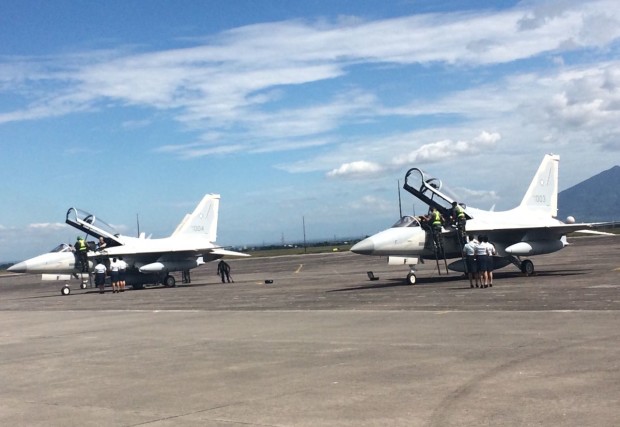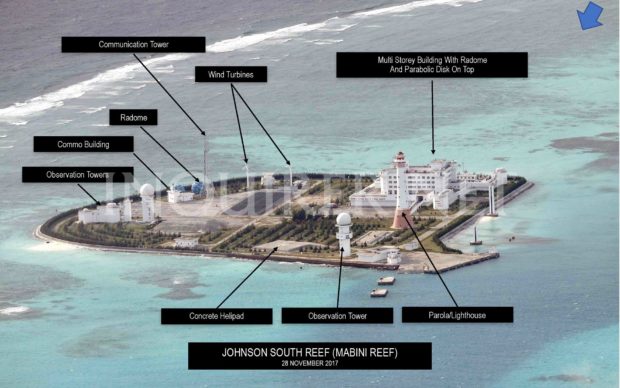New PH security strategy requires bold Navy, Air Force capability buildup

Two FA-50 PH Aircraft arrive at Haribon Hangar, Clark Air Base, Pampanga. NIÑO JESUS ORBETA/Philippine Daily Inquirer
The government’s newly-released national security strategy (NSS) has called for an aggressive modernization of the Philippine Navy and Air Force, and increase in the number of its personnel in the face of rising external threats.
In the 70-page NSS, stakeholders recognized the urgency of updating the capability of the Navy and Air Force “as quick as possible” to beef up external defense and ensure protection of Philippine domain and sovereignty.
“There is a need to increase the size and deterrent capability of the Navy and Air Force as quickly as possible to serve as our external defense, protect our national territory and exclusive economic zone, and modernize all branches of the armed forces,” the document read.
There are currently 125,000 soldiers and officers of the Armed Forces of the Philippines, with about 85,000 coming from the Philippine Army, the biggest branch of the nation’s military service.
Modernization of military capabilities recently moved forward with the approval of the second phase of the program, which includes the acquisition of multi-role aircraft, frigates, corvettes anti-submarine helicopters, towed and self-propelled howitzers, and multiple launch rocket system.
Article continues after this advertisementHowever, despite the pressing need to focus on external threats, the government continues to face domestic security threats like insurgency: “Resolving internal armed conflicts remains our top security concern and a key cornerstone of our peace and development strategy.”
Article continues after this advertisement“Resolving the country’s domestic troubles has gained more significance as the nation endeavors to better define its role in relation to the outside world, which is currently in a rapid state of flux. If unprepared, the Philippines will find it quite difficult to face its external challenges and to fully take advantage of new and exciting possibilities in the emerging global economic order,” the document noted.
‘Whole-of-nation’ campaign
The NSS published last May is in line with the objectives set with the administration’s National Security Policy (NSP) 2017 to 2022.
“As an extension of the NSP, the NSS articulates in operational terms the process of pursuing the national security agenda,” it said.
Copies of the NSS were released at a forum on security held at the Philippine International Convention Center on Wednesday. “Tatak ng Pagbabago: Tatak ng Pag-unlad” is part of a series ahead of President Rodrigo Duterte’s 3rd State of the Nation Address on Monday, July 23.
The new strategy also included other aspects of national security and was not limited to territorial integrity and sovereignty. Illegal drugs and fighting criminality, for instance, were “very high on the list of priorities of the current administration.”
It also called for a “whole of nation” campaign, to remind all sectors in the Philippine society that they have a role to play – from the government, businesses to general public.
Sea dispute
The NSP published in 2017 viewed the dispute over the West Philippine Sea as “the foremost security challenge to the Philippines’ sovereignty and territorial integrity.”
To address the external security challenges, “the Philippines should strengthen cooperation and peaceful approach with the countries sharing common maritime borders and interests.”
It backed bilateral, regional and global mechanisms to promote peace and security, the rule of law, and peaceful resolution of the disputes.
Promote landmark ruling
The new strategy called for a “media campaign at home and abroad” to promote the landmark ruling of the Philippines’ maritime case against China over the South China Sea.
“Relatedly, a media campaign at home and abroad on the Award issued by the Tribunal of the United Nations Convention on the Law of the Sea on the West Philippine Sea dispute is called for,” it said.
Ironically, President Rodrigo Duterte – who assumed office two weeks after The Hague handed down the favorable arbitral ruling on July 12, 2016 – has set aside the landmark decision in exchange of economic aid and investments from China, while the Asian giant refused to acknowledge the tribunal verdict.
China has even become more aggressive in militarizing the South China Sea with the recent deployment of warfare assets as well as the continued harassment of Filipino fishermen in Scarborough Shoal.
Presidential spokesperson Harry Roque said the administration continues to assert its rights over the West Philippine Sea even if The Hague ruling is not enforced.
Maritime and airspace security
Lack of equipment and resources from meager border security and defense funding has led to the difficulty of the Philippines to patrol its coastlines – one of the longest in the world, the NSS pointed out.
“There is an urgent need to develop a modern and adequately-equipped border security force capable of ensuring maritime and air space security,” the NSS stated.
Authorities should also strengthen in enforcing laws to counter illegal activities within the Philippines’ maritime and air spaces, it added.
The NSS likewise called on the government to allocate at least 2 percent of the GDP as the minimum annual budget for the defense sector “in order to elevate ourselves from the (near) bottom position and quickly catch up with our Asean neighbors.”
It cited Myanmar, whose GDP per capita is smaller than the Philippines, for allocating 4.8 percent of its GDP for military expenditure in 2016.
“It is a sad fact that despite the lessons of the past, our armed forces remain one of the weakest in Asia, putting in doubt our ability to protect and defend our sovereignty and territorial integrity,” the NSS pointed out. /kga
RELATED STORIES
Lorenzana tells AFP, allies to anticipate the future of air conflict
